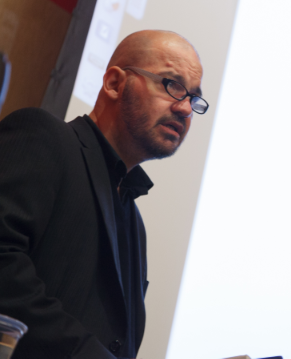Austrian Writer Shares Stories

Thomas Glavinic, Austrian writer-in-residence, explains his writing to students.
Every year, the German Department at Dickinson invites one writer-in-residence to spend the spring semester on campus. This spring, Viennese author Thomas Glavinic has accepted the position as part of the Max Kade Foundation, which helps fund German events throughout the year.
Associate Professor of German Sarah McGaughey commented on the process of choosing the writer-in-residence. She said, “The German Department collaborates and chooses together based on contemporary criticism and reception of authors in Germany, Austria and Switzerland.” The decision is not only based upon criticism, however. As McGaughey mentioned, “The major criteria behind the choice is how the author’s oeuvre fits into our students’ learning and our courses. This year, we were able to incorporate two of Thomas’ books into our courses.”
Glavinic himself has maintained an organized schedule during his time here. “My days are almost always the same. I start the morning in either Helena’s [Café] or the Biblio, and then I write for a few hours. I take a break for lunch, and go back to writing. To end the night I watch House of Cards on my computer.”
Though Glavinic’s daily plan is certainly busy, he does benefit from it. As he said, “I write much more than I do at home, because I have more time. Here I am also more focused and concentrated.” On average, Glavinic noted, “I write about two or three pages a day. I also have time to revise what I have already written, which is another very important aspect of the writing process.”
For Glavinic, staying on task is crucial: “The publishing house needs the book by October or November of this year,” he said. He greatly appreciates the time he has now, because in Austria he has other concerns. He said, “I have an eleven-year-old son who I care about and look after. And I have friends, so my social obligations.” Despite those considerations, he stated that he plans to remain very concentrated upon his return to Vienna.
According to McGaughey, “Theoretically we can invite artists and musicians as well; it does not have to be a writer-in-residence. That would definitely be a possibility for the future.” For her it is most important that the visitor works well with students. She stated, “There are few colleges in the U.S. who are able to offer students such close contact with authors, and ours is one that benefits from introducing students to some of the most prominent authors writing in English and German.”
As for Glavinic, he has had a positive experience in Carlisle. “Working in the U.S. has given me so many impressions; in Germany that would be different because it is another culture. I was in America for the first time as a child, but that was not real USA like it is here.” Though he is still taking in the culture here, he said, “I am glad it is foreign and different. It is nice to have so much peace here, and to get so much work done.”
Students who are interested in learning more about Glavinic have until May 6, when he returns to Vienna, and can talk to him in the Biblio.




